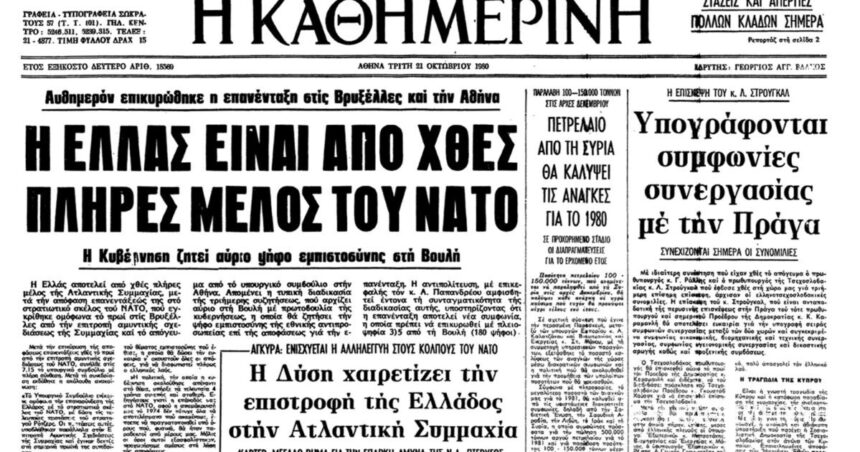The Turkish invasion of Cyprus in 1974 brought Greece and Turkey to the brink of war. Although there were clashes between Greek and Turkish forces in Cyprus, there were no incidents in the Aegean area and in Thrace. In reaction to Attila II, the Greek government of national unity under Konstantinos Karamanlis withdrew the country from the military arm of the North Atlantic Treaty Organization (NATO). This specific action reflected the mood of the Greek people towards the Alliance, which remained inactive towards Turkey regarding the invasion of Cyprus. The government calculated to activate with this move the reflexes of Greece’s allies.
Withdrawal from NATO’s military arm, however, degraded the country’s position vis-à-vis Turkey in the Alliance and removed it from decision-making mechanisms. The country soon requested its reintegration, in September 1975.
The Turkish side raised obstacles to the reintegration of Greece. Greece’s withdrawal from NATO’s military arm had given Turkey the opportunity to meet the alliance’s operational needs in the Aegean. For the reintegration of Greece, Turkey requested the review of the zones of operational control in the Aegean. It was the period when Turkish foreign policy was looking for ways to project claims in the Aegean.
The objections of the Turkish side were overcome in the fall of 1980. On October 19, 1980, the government of Georgiou Ralli accepted the proposals of the Alliance, which concerned the reintegration of Greece as a fully equal member. “Greece has been a full member of the Atlantic Alliance since yesterday, following the decision to rejoin the military arm of NATO, which was unanimously approved in the morning in Brussels by the defense planning committee of the Alliance and in the afternoon by the cabinet in Athens. What remains is the formal procedure of the three-day debate, which begins tomorrow in the Parliament at the initiative of the government, which will request a vote of confidence from the national delegation on the decision on reintegration”, reported “Kathimerini” on the front page of October 21, 1980.
The details of the Greece-NATO agreement seem to have occupied the Greek press quite a bit. Kathimerini wrote about it: “NATO sources stated that the real reintegration of Greece will follow a plan negotiated by General Rogers with Greece and Turkey. No details were made known, but it is believed that Greece will immediately regain its share of the common defense on the southern flank of the Alliance. […] The main effect of the decision for the return of Greece to NATO will be to allow the planners of N.A.T.O. to draw up contingency plans in the region, with the certainty that Greece will stand with its allies in the event of a crisis, a military source said. […] The reintegration of Greece means that Greek radars will resume feeding NATO’s early warning system with information and that Greece will once again participate in NATO’s military exercises.
Column editor: Myrto Katsigera, Vassilis Minakakis, Antigone-Despina Poimenidou, Athanasios Syroplakis









